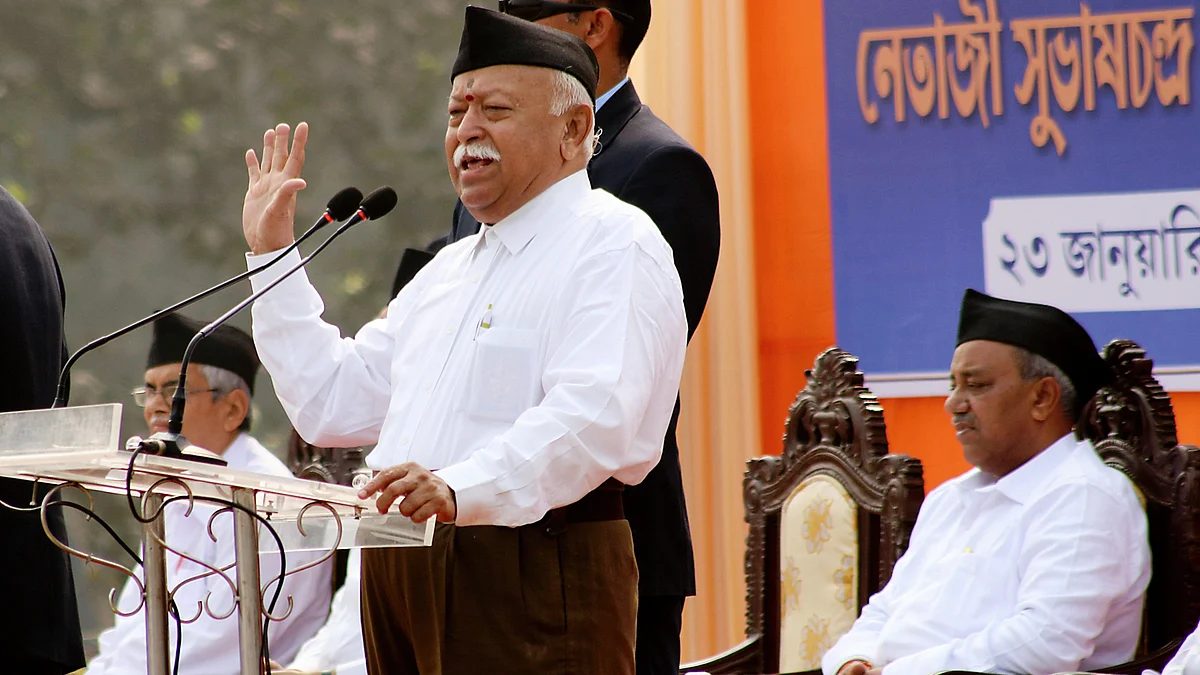Nation
Once again, Mohan Bhagwat gets the Hindutva ecosystem buzzing
Even the RSS mouthpiece Organizer appears to be distancing itself from Bhagwat’s stance on politicising religious issues

Speaking at a seminar organised by the political think tank Global Strategic Policy Foundation (GSPF) in Pune, RSS (Rashtriya Swayamsevak Sangh) chief Mohan Bhagwat recently issued a strong call for communal harmony and unity in India.
Referring to attempts to exploit religious issues for political or personal gain, Bhagwat said, "After the construction of the Ram Mandir, some people think they can become leaders of Hindus by raking up similar issues in new places, but this is not acceptable. Every day, a new matter is being stirred up. How can this be allowed? This cannot continue. India needs to show that we can live together."
Bhagwat’s remarks come in the wake of communal clashes in Sambhal, sparked by a court-ordered excavation near a centuries-old mosque. The violence claimed six lives from the Muslim community, raising concerns over rising sectarian tensions and the politicisation of religious disputes.
The RSS supremo's comments have ignited sharp reactions within Hindutva circles. Several fringe Hindutva outfits criticised Bhagwat, accusing him of not representing the voice of 'Sanatan dharma' and lacking the authority to dictate terms to Hindu society. Even the RSS mouthpiece Organizer appeared to distance itself from Bhagwat’s stance, signalling a potential rift within the Sangh Parivar.
Published: undefined
The Organiser’s cover story and editorial advocate that seeking the truth regarding historically invaded or demolished religious spaces is essential and justified.
However, GSPF chairman Dr Anant Bhagwat, a radiologist by profession, defended the RSS chief’s remarks. Speaking to reporters, he explained, "What Mohan Bhagwat said was nasihat (advice) for the greater good of the nation. His message was directed at both Hindus and Muslims. You cannot use Hindu-Muslim issues for political gains. If there is anarchy in the country, foreign powers will exploit the situation."
Addressing concerns about the growing influence of fringe Hindutva elements, sometimes referred to as 'Hindutva 3.0', Bhagwat emphasised the importance of adhering to the Constitution and rule of law. "If there is any controversy, we have laws and the Constitution to resolve it. We must set an example for the world. We cannot allow enemies of India to exploit our internal conflicts," he said.
Responding to questions about Prime Minister Narendra Modi's cult overshadowing of the RSS’ traditional role, Bhagwat reiterated the Sangh’s disapproval of personality cults. Without naming Modi directly, he remarked, "Personality cults may be necessary during elections, but they are not good for the polity."
Published: undefined
Asked whether the RSS aims to replace Modi as the face of the BJP, Bhagwat dismissed the notion of permanent leadership, saying, "Today, Modi is the face. Tomorrow, Yogi Adityanath may be the face, Nitin Gadkari may be the face."
It is worth recalling here that this is not the first time that Bhagwat has expressed reservations about the current political trajectory. After the 2024 Lok Sabha elections, when the BJP secured a vastly reduced majority, Bhagwat reportedly critiqued Modi’s governance style during an internal Sangh meeting, pointing out that excessive centralisation of power and over-reliance on Modi’s charisma had alienated sections of the BJP cadre and eroded the party’s grassroots connection.
Bhagwat had then stated that a true leader or sevak (server) must work with dignity and decorum, avoiding arrogance or self-praise. His remarks were clearly aimed at Modi, underlining the need for leaders to embody selflessness in their service.
Published: undefined
Later, during an event in Pune, Bhagwat cautioned against self-deification, remarking that leaders should not see themselves as divine but let their actions speak for them. This comment was interpreted by many as a veiled critique of Modi's tendency to project himself as an almost messianic figure during the election campaign.
Additionally, Bhagwat raised concerns about the tone of the BJP's campaign rhetoric, urging greater restraint and dignity in political discourse. He also stressed that the Opposition should be regarded as partners in a democratic system, rather than adversaries to be vanquished, highlighting the need for a more inclusive and respectful approach to governance.
Bhagwat’s latest remarks have intensified debates within the Sangh Parivar and beyond, highlighting tensions in the Hindutva family.
As India grapples with rising communal polarisation, Bhagwat’s call for harmony serves as a timely reminder of the need to prioritise national unity over divisive politics. However, the mixed reactions to his statements indicate a deepening divide within the Hindutva ecosystem regarding the future direction of the movement.
Published: undefined
Follow us on: Facebook, Twitter, Google News, Instagram
Join our official telegram channel (@nationalherald) and stay updated with the latest headlines
Published: undefined